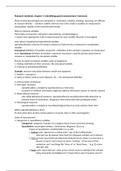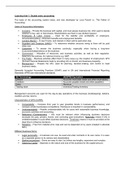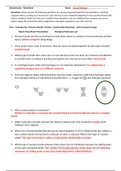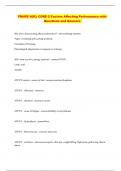Many of what psychologists are interested in -motivation, emotion, thinking, reasoning- are difficult
to measure directly. – construct validity: refers to how well a study’s variables are measured or
manipulated. (quality of the measurements/study)
Ways to measure variables
Three types of measures: self-report, observational, and physiological.
+ choose most appropriate scale of measurement for each variable they plan to investigate.
more about conceptual and operational variables
operationalization: process of turning a construct of interest into a measured or manipulated
variable.
Conceptual definition of Variable: researcher’s definition of the variable in question at a theoretical
level. Operational definition of Variable: represents researcher’s specific decision about how to
measure or manipulate the conceptual variable.
Process to study conceptual variables (such as happiness):
1. Stating a definition of their construct: the conceptual variable
2. Creating an operational definition.
Example: measure association between wealth and happiness
1. Wealth = conceptual
2. Salary in dollars, bank account balances, etc. = the operational definition
3 common types of measures
1. Self-report measures
operationalizes a variable by questionnaires or interviews
(research on children: self-reports might be replaces with parent reports or teacher reports)
2. Observational measures
also called behavioural measures, operationalizes by recording observable behaviour or
physicial traces of behaviours. (happiness: how many times does participant smile)
3. Physiological measures
operationalizes a variable by recording biological data (e.g. brain activity, heart rate)
Which operationalization is best?
It’s best when they all show similar patterns of results, they’re often used together.
Scales of measurement
1. Categorical vs. quantitative variables
Categorical: categories. Number of a category doesn’t have numerical meaning.
Quantitative: meaningful numbers. Centimetres, kilograms, IQ-score
3 types of quantitative variables(table 5.2, p.124):
1. Ordinal scale: represents a ranked order. ‘top 10 best-selling books’
intervals may be inequal, how much is in between numbers isn’t relevant.
2. Interval scale: equal intervals (distances) between levels, there’s no true zero. A
person can get 0, but it does not mean “nothing”. because of that
researcher can’t say things like ‘twice as’ or ‘three times…’ (e.g. IQ scores,
100-105-110)
3. Ratio scale: equal intervals, value of zero means none or nothing of the variable
being measured. Knowledge test: 0 means there were 0 answers correct.












